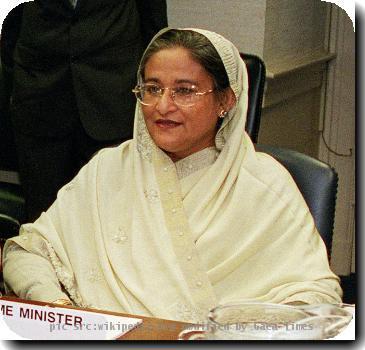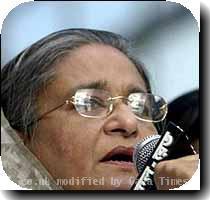Nepal shares joy, sorrow with two nations
By Sudeshna Sarkar, IANSSunday, August 15, 2010
KATHMANDU - As India celebrated its 64th Independence Day Sunday with pride and pomp and Bangladesh mourned for the assassination of the architect of the nation, Sheikh Mujibur Rahman, 35 years ago, the two nations’ South Asian neighbour Nepal shared the joy and sorrow of both.
Ignoring a transport strike called by an indigenous group, dozens of people queued up at the Indian Embassy in Kathmandu to attend the hoisting of the Indian tricolour by the Indian ambassador, Rakesh Sood, and the reading out of the address to the nation by the Indian President, Pratibha Patil.
Gyan Hari Acharya travelled on bad roads worsened by the monsoon for three days to attend the celebrations. The principal of the Shree Lamchi Lower Secondary School came from Ar-ghakhanchi, one of the worst-affected districts during the 10-year Maoist insurgency.
His school is among the 25 institutions chosen this year for the Indian government’s annual gift of books to libraries.
The embassy also donated 16 ambulances and four buses to Nepali organisations.
One of the highlights of the Independence Day celebrations was the launch of Bhu Puu 2010, the annual journal of ex-servicemen.
Hundreds of Nepalis have been serving in the Indian Army since its inception in 1947 and close on the heels of the 64th Independence Day, the Indian Army has flown in a team of specialist doctors from India to hold a medical camp in Butwal town from Tuesday.
Gorkha soldiers who once fought for the Indian Army will turn up at the camp to collect their pension. Hundreds will also bring ailing family members to receive medical treatment, cataract operations and medicine.
While the mood in the sprawling embassy grounds was one of hope and pride, at the Bangladesh Embassy, it was sombre as former freedom fighters and diplomats mourned the slaying of Sheikh Mujib, known as Bangabandhu, the friend of India.
Bangladesh observes Aug 15 as the day of national mourning in remembrance of “the most barbaric political assassination in history” in 1975 when Sheikh Mujib and 18 more people were gunned down, including his wife and three sons.
The national flag was flown at half-mast while the message by the Prime Minister of Bangladesh, Sheikh Mujib’s daughter Sheikh Hasina, renewed the pledge to find the remaining assassins, who have fled the country, and bring them to justice.
The message also said that it has begun a trial to punish war criminals - people who had committed atrocities during the freedom movement of 1971 that led to then East Pakistan separating from Pakistan to become the sovereign republic of Bangladesh.
(Sudeshna Sarkar can be contacted at sudeshna.s@ians.in)

